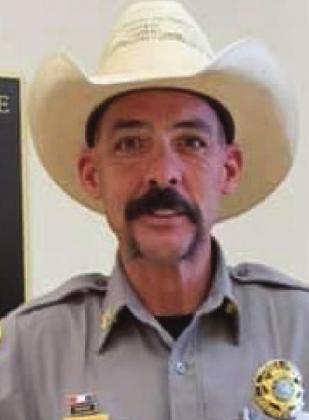Local law enforcement and legislation in Santa Fe
GRANTS, N.M. - The State of New Mexico is currently in its 55th legislative session. There are several bills that have local law enforcement concerned. Those bills are House Bill 4- Civil Rights Act, House Bill 140- Minimum Sentencing, House Bill 254-Police Use of Force and Reporting, House Bill 263- Criminal Justice Reform, Senate Bill 192-Law Enforcement Disclosure of Evidence, Senate Bill 105-Law Enforcement Assisted Diversion and Senate Bill 376-Qualified Immunity.
Cibola County Sheriff Tony Mace said in a letter to the editor (see page A4), "This session has brought to the table a dozen of more bills squarely aimed at making law enforcement the enemy of the people, while si multaneously introducing other bills that are designed to lift the burden on the criminal.
“My questions to the legisla ture are why are you doing this? Where is this coming from? What’s triggering this?” Mace asked. “We don’t have the problems in our community or even our state like you see in Portland [Oregon], San Francisco [California] and Chicago [Illinois] and some of these other heavily populated areas.”
Mace said last year the Albuquerque Journal released a poll where 76 percent of the people polled said they were satisfied with the job law enforcement is doing, while 12 percent said they were not happy with law enforcement. Also, in the same poll 24 percent said the police need more funding and resources and help.
“These bills are going to affect how we can do our job and in a roundabout way these bills could lead to the law enforcement being defunded,” Mace said.
“The far left of the Democratic Party wants it; they want to do away with local police,” Grants Police Chief Steve Chavez said. “They want it, so they can now federalize the police. Back East they have taken policing away from the sheriffs. They have taken the law away from elected sheriffs, which is our constitution and they have created city police forces. To me, police need to be local, not a federal police force.”
Chavez said the local police need to be accountable and the citizens need to have someone to contact. But if it becomes a federalized police force who are the citizens going to contact?
Mace said that what [N.M.] House Bill 4 does is put money in all the civil attorneys’ pockets that are legislators.
“You got legislators enacting laws in which they can financially benefit from,” Mace said. “House Bill 4 is financially driven.”
House Bill 4: Relating to civil right; enacting the New Mexico Civil Rights Act; Permitting an individual to bring a claim against a public body or person acting on behalf of or under the authority of a public body for a violation of the individuals rights, privileges or immunities arising pursuant to the Constitution of New Mexico; Prohibiting the use of the defense of qualified immunity; Mandating attorney fees; Providing a three-year statute of limitations.
“This will affect law enforcement, fire fighters, teachers, doctors, home health care workers, it is going to affect all of this,” Mace said. “These legislators stand to make millions of dollars on House Bill 4.”
Mace said with this, small rural communities or counties insurance will be sky high and these agencies will have to either not provide insurance to their officers or have the officers get bonded.
“It’s just another way to them [state legislature] to defund the police,” Mace said.
The sheriff added that there is already relief in place for all the legislation, but they [the legislators] want people to believe there is not.
“There are reliefs set in place for when a cop acts outside the scope of their policies and procedures,” Mace said. “The problem is they are pushing for attorney’s fees so they can make more money.”
House Bill 140 is relating to sentencing; Eliminating certain mandatory minimum sentences.
Mace believes this bill is a precursor to the legalization of recreational use marijuana.
“This type of bill will tie our hands because it will change how criminals are prosecuted,” Mace said. “It’s already happening in California. Drug dealers will stand openly on the corner dealing drugs and all the police can do is issue them a citation.”
According to Mace, the minimum sentencing bill goes right along with the “use of force” bill. He said the legislators want the public to believe that law enforcement is out there using choke holds on people.
“Law enforcement has not taught choke holds since 1984,” Mace said.
He predicted that if these bills are passed, all the legislation is doing is taking the proactive approach away from the police departments and making them reactive instead.
Both Mace and Chavez agree that if these bills do pass, many officers will make decisions to either find a different line of work or move to a state where the law enforcement officer is supported by the state.
“Defunding the law enforcement is what this is all about. Small agencies won’t survive and eventually the state will take over the policing using the state police, making our state a policed state by the governor’s police department now as the state police,” Mace said.
To view the proposed bills, visit nmlegis.gov.
The Cibola Citizen will continue this story with Sheriff Mace and Chief Chavez in next week’s edition.


